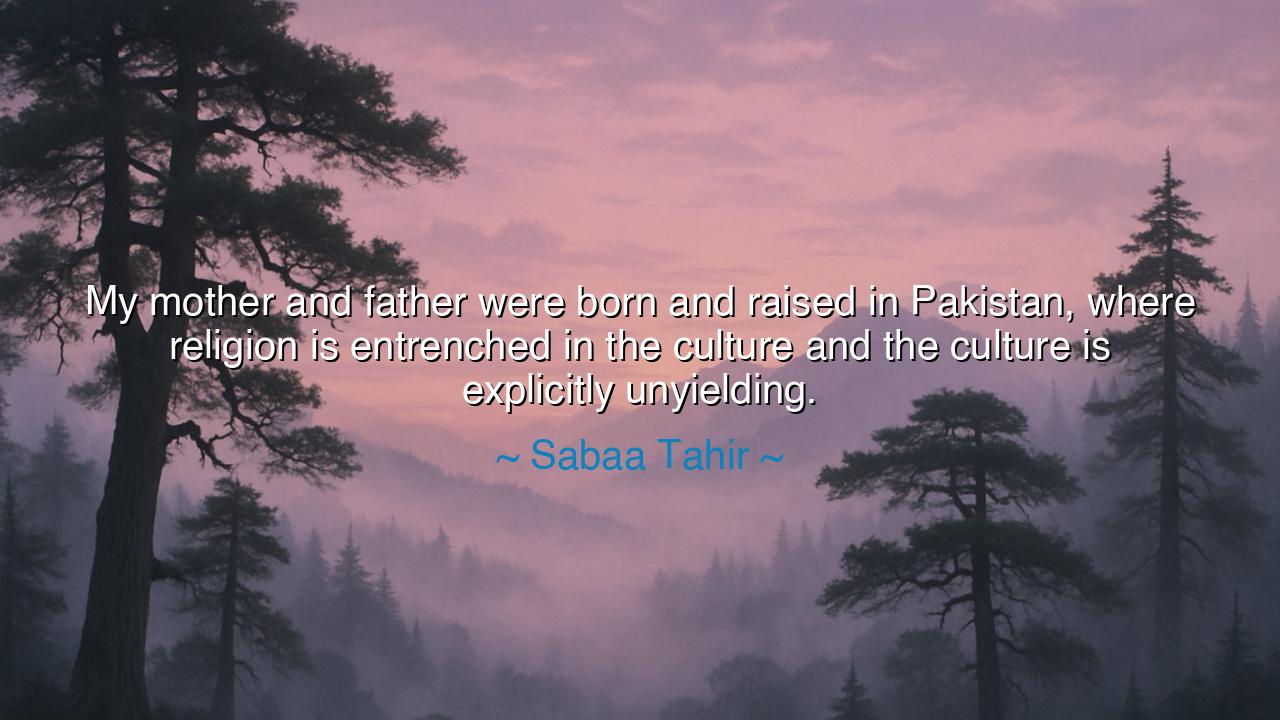
My mother and father were born and raised in Pakistan, where
My mother and father were born and raised in Pakistan, where religion is entrenched in the culture and the culture is explicitly unyielding.






The words of Sabaa Tahir—“My mother and father were born and raised in Pakistan, where religion is entrenched in the culture and the culture is explicitly unyielding.”—are both tender and weighty, carrying the memory of heritage and the recognition of struggle. They speak of roots sunk deep into a land where religion is not a private matter, but a living force woven into every rhythm of life. In them, we hear not only the story of her parents, but the broader truth of cultures where tradition is strong, where identity is forged by customs both beautiful and unbending.
The origin of this reflection lies in Tahir’s own family history, shaped by migration and the meeting of worlds. Born to parents who carried the weight of Pakistan’s traditions and faith, she herself was raised in America, straddling two identities—one deeply entrenched in culture and the other immersed in new freedoms. Her words express the tension between reverence for heritage and the recognition that such cultural foundations are often unyielding, demanding obedience and leaving little room for dissent or deviation. It is the voice of one who seeks to honor her roots yet acknowledges their challenges.
Throughout history, this interplay between culture, faith, and unyielding tradition has been a shaping force in nations and in lives. Consider the story of Socrates in ancient Athens. He lived in a society where religion, myth, and civic tradition were tightly interwoven. Yet when he began to question those traditions, he was condemned for impiety, forced to drink the hemlock. His tale, like Tahir’s words, reminds us that cultures deeply bound by faith and tradition often resist change, and those who question the order may find themselves at odds with the unyielding structures of society.
There is also a heroic quality in recognizing the dual nature of such cultural depth. On the one hand, entrenched religion and tradition can give a people resilience, identity, and unity. It gives them songs to sing, rituals to preserve, and a sense of belonging that weathers generations. On the other hand, when these same traditions refuse to bend, they can crush individuality, silence dissent, and make it difficult for new ideas to breathe. Tahir’s reflection embodies this duality: reverence for the strength of her parents’ world, but also awareness of its rigidity.
Her words also echo the struggles of countless immigrants who journey to lands where the new culture is more fluid, more permissive, more open to questioning. The children of such families often live between two fires: one of heritage that demands loyalty, and one of freedom that invites exploration. In such a crucible, identity is forged. This struggle is not only personal but universal, for humanity itself has always stood between tradition and change, between what must be preserved and what must be transformed.
The lesson for us is profound: honor the strength of your roots, but do not fear to question them. For heritage is a foundation, not a prison. Let the entrenched traditions of your past give you identity, but do not let them bind your spirit if they prevent you from living fully and truthfully. Even the most unyielding cultures may be softened over time, not through rejection alone, but through dialogue, courage, and the living of new examples.
Practically, this means walking a path of balance. Hold fast to what is noble in your heritage—its discipline, its beauty, its sacredness—but do not hesitate to let go of what suffocates growth. Seek to understand those who stand firm in tradition, but also raise your voice for freedom, equality, and compassion. For the future belongs not to those who break away in bitterness nor to those who cling blindly, but to those who build a bridge between the two.
Thus, Sabaa Tahir’s words endure as a reminder to all children of heritage: the past may be entrenched, the culture may be unyielding, yet out of this tension can come strength, identity, and the courage to carve a new way forward. For the soul that honors its roots but dares to grow beyond them will not only preserve the wisdom of the ancestors but also bring forth new wisdom for the generations to come.






AAdministratorAdministrator
Welcome, honored guests. Please leave a comment, we will respond soon